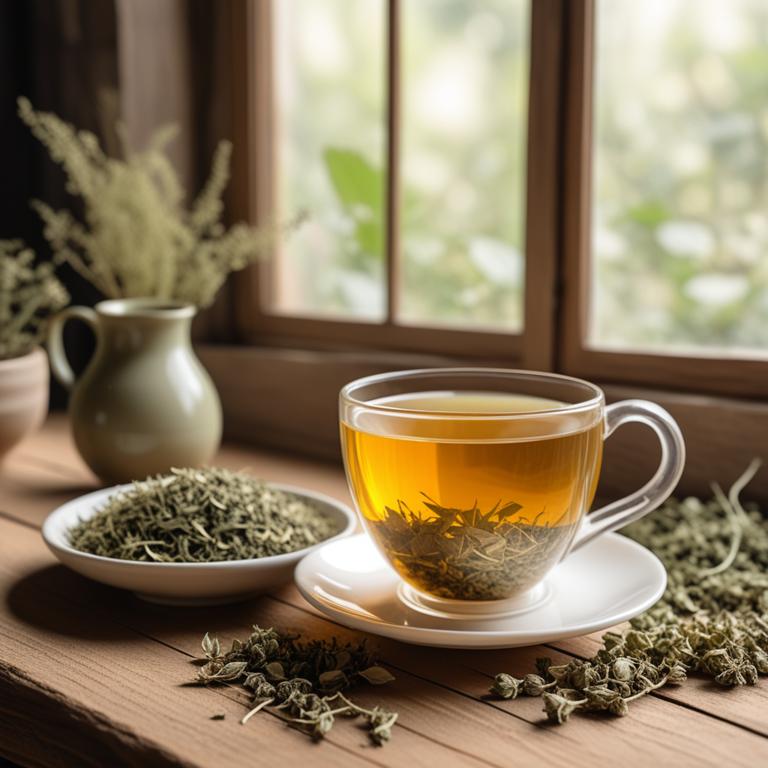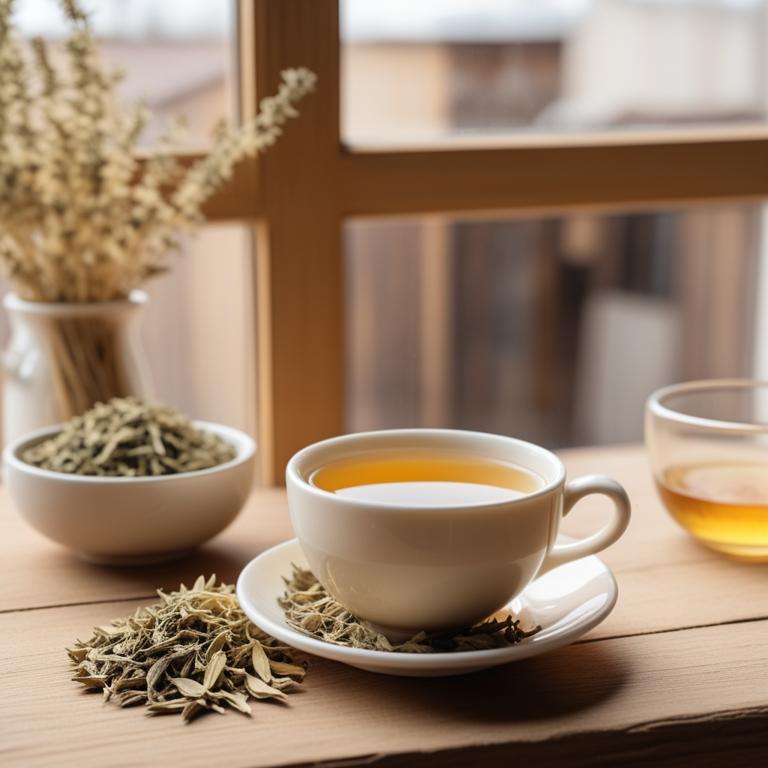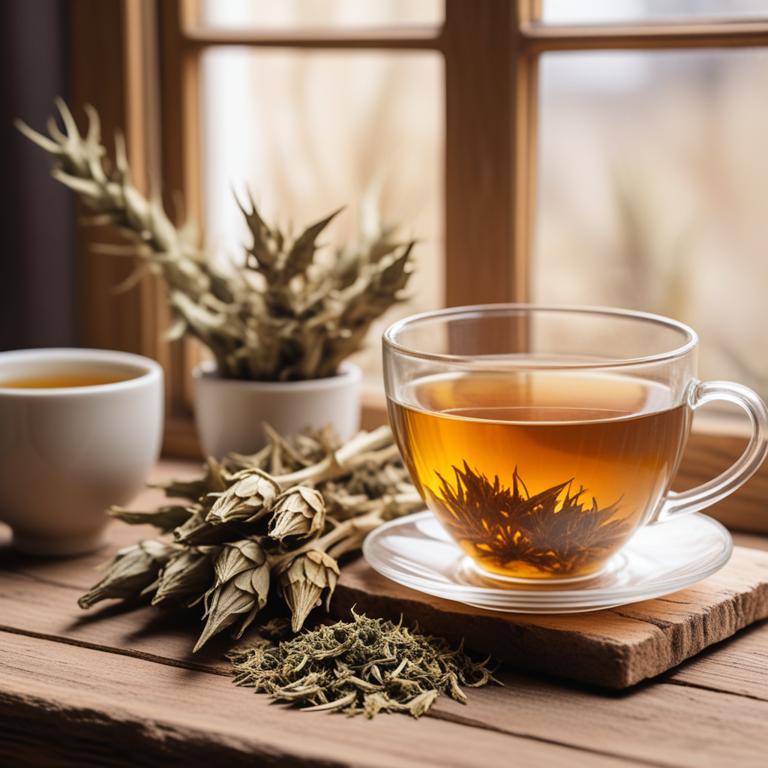10 Herbal Teas For Chronic Hepatitis

Herbal teas have been used for centuries to help manage chronic hepatitis, a condition where the liver becomes inflamed.
One reason these teas are effective is that they contain powerful antioxidants and anti-inflammatory compounds that help reduce liver damage and promote healing. For example, turmeric tea, made from Curcuma longa, contains a compound called curcumin, which has potent anti-inflammatory properties that help reduce liver inflammation and scarring. Licorice root tea, made from Glycyrrhiza glabra, contains a compound called glycyrrhizin, which helps protect the liver from damage and promotes the growth of new liver cells. Milk thistle tea, made from Silybum marianum, contains a compound called silymarin, which helps repair damaged liver cells and improve liver function.
Drinking these teas can bring several benefits to your life. They can help reduce fatigue and discomfort associated with chronic hepatitis, allowing you to enjoy activities you love without feeling tired or weak. They can also help improve your appetite and digestion, which can be affected by liver disease. Additionally, these teas can help boost your immune system, making it easier to fight off infections and other illnesses.
By incorporating herbal teas into your daily routine, you can take control of your liver health and feel more energetic and confident.
- 1. Curcuma longa
- 2. Glycyrrhiza glabra
- 3. Silybum marianum
- 4. Zingiber officinale
- 5. Taraxacum officinale
- 6. Ginkgo biloba
- 7. Astragalus membranaceus
- 8. Cynara scolymus
- 9. Echinacea purpurea
- 10. Phyllanthus niruri
1. Curcuma longa

Curcuma longa teas contains the bioactive constituents curcumin, demethoxycurcumin, and bisdemethoxycurcumin.
These compounds have potent anti-inflammatory and antioxidant properties, which help reduce liver inflammation and damage associated with chronic hepatitis. Curcumin also inhibits the production of pro-inflammatory enzymes and cytokines, which contribute to liver fibrosis and scarring. Additionally, curcumin has been shown to improve liver function and reduce oxidative stress, helping to protect liver cells from damage.
By reducing inflammation and oxidative stress, curcuma longa teas may help alleviate symptoms and slow disease progression in individuals with chronic hepatitis.
- Gather 1 teaspoon of dried Turmeric root powder (Curcuma longa) and 1 cup of boiling water.
- Steep the Turmeric powder in the boiling water for 5-7 minutes to make a strong tea.
- Strain the tea using a fine mesh sieve or cheesecloth to remove the powder.
- Add 1 tablespoon of honey or lemon to taste, if desired.
- Drink the tea 2-3 times a day, preferably after meals, for chronic hepatitis relief.
2. Glycyrrhiza glabra

Glycyrrhiza glabra teas contains glycyrrhizin, a triterpenoid saponin that has been shown to have anti-inflammatory properties.
This compound helps to reduce liver inflammation, which is a major contributor to the progression of chronic hepatitis. Glycyrrhizin also has antioxidant properties, which help to protect liver cells from damage caused by free radicals. Additionally, Glycyrrhiza glabra teas contain flavonoids, such as liquiritin and isoliquiritin, which have been found to have anti-viral properties that can help to reduce the severity of hepatitis.
By reducing inflammation and protecting liver cells, Glycyrrhiza glabra teas may help to slow the progression of chronic hepatitis.
- Gather 1 tablespoon of dried Glycyrrhiza glabra root and 1 cup of boiling water.
- Steep the root in the boiling water for 5-7 minutes.
- Strain the liquid into a cup and discard the root.
- Add 1 tablespoon of honey (optional) to the tea for taste and to help soothe the liver.
- Drink the tea 2-3 times a day, ideally before meals, for chronic hepatitis relief.
3. Silybum marianum

Silybum marianum teas contains silymarin, a mixture of flavonoids and polyphenols.
Silymarin has anti-inflammatory and antioxidant properties, which help protect liver cells from damage and promote their regeneration. The flavonoids in silymarin, such as silybin and isosilybin, inhibit the production of pro-inflammatory cytokines, which contribute to liver inflammation and scarring in chronic hepatitis. Silymarin also has a hepatoprotective effect, which helps to repair and restore liver function in people with chronic hepatitis.
By reducing oxidative stress and inflammation, silymarin helps to slow down the progression of liver disease and improve liver function in individuals with chronic hepatitis.
- Gather 1 cup of dried Silybum marianum flowers and leaves. You can buy them at a health food store or online.
- Boil 2 cups of water in a pot.
- Add 2 tablespoons of dried Silybum marianum flowers and leaves to the boiling water. Remove from heat.
- Let the mixture steep for 5-7 minutes. Strain the tea using a fine-mesh sieve or cheesecloth.
- Drink 1 cup of the tea 2-3 times a day, preferably after meals. Store any leftover tea in the fridge for up to 24 hours.
4. Zingiber officinale

Zingiber officinale teas contains gingerols, shogaols and zingerone, which are the key bioactive constituents.
These compounds have anti-inflammatory and antioxidant properties that help reduce liver inflammation and oxidative stress. The gingerols in Zingiber officinale teas have been shown to inhibit the production of pro-inflammatory cytokines, which are molecules that promote inflammation in the liver. Shogaols have been found to have antioxidant properties, which help protect liver cells from damage caused by free radicals.
By reducing liver inflammation and oxidative stress, Zingiber officinale teas may help alleviate symptoms of chronic hepatitis.
- Gather 1 tablespoon of dried Zingiber officinale (ginger) root and 1 cup of boiling water.
- Add the ginger to the boiling water and let it steep for 5-7 minutes.
- Strain the mixture and discard the ginger.
- Add honey or lemon to taste (optional).
- Drink 1/2 to 1 cup of the tea 2-3 times a day to help manage chronic hepatitis symptoms.
Zingiber Officinale Tea on Amazon
FGO Organic Ginger Tea, 100 Count, Eco-Conscious Tea Bags, Caffeine Free, Packaging May Vary (Pack of 1)
Disclaimer: We earn a commission if you click this link and make a purchase at no additional cost to you.
5. Taraxacum officinale

Taraxacum officinale teas contains bioactive constituents like sesquiterpenes, flavonoids, and alkaloids.
These compounds have anti-inflammatory and antioxidant properties, which help to reduce liver inflammation and damage caused by chronic hepatitis. The sesquiterpenes, particularly taraxasterol, have been shown to inhibit the growth of hepatitis-causing viruses, such as hepatitis B and C. The flavonoids and alkaloids in Taraxacum officinale teas also have antioxidant properties, which help to protect liver cells from oxidative stress and damage.
By reducing inflammation and protecting liver cells, Taraxacum officinale teas may help to alleviate symptoms and improve liver function in individuals with chronic hepatitis.
- Get 1 cup of fresh Taraxacum officinale leaves and flowers. Wash them with cold water.
- Steep 1 tablespoon of Taraxacum officinale in 1 cup of boiling water for 5-7 minutes.
- Strain the mixture into a cup and discard the solids.
- Add 1 tablespoon of honey (optional) to the tea for sweetness.
- Drink the tea 2-3 times a day, on an empty stomach, for chronic hepatitis symptoms.
6. Ginkgo biloba

Ginkgo biloba teas contains flavoglycosides, bilobalide and ginkgolides.
These compounds have anti-inflammatory properties that help reduce liver inflammation associated with chronic hepatitis. The flavoglycosides also have antioxidant properties, which can neutralize free radicals that damage liver cells. The bilobalide component improves blood flow to the liver, increasing oxygen delivery and nutrient uptake, which supports liver function and regeneration.
By reducing inflammation and improving liver health, Ginkgo biloba teas may help alleviate symptoms of chronic hepatitis.
- Gather 1 cup of fresh or dried Ginkgo biloba leaves, 1 cup of boiling water, and a teapot.
- Measure 1 tablespoon of Ginkgo biloba leaves and add them to the teapot.
- Pour 1 cup of boiling water over the leaves and let it steep for 5-7 minutes.
- Strain the tea into a cup using a fine-mesh sieve or cheesecloth.
- Drink 1 cup of the tea, 2-3 times a day, as directed by a healthcare professional for chronic hepatitis treatment.
7. Astragalus membranaceus

Astragalus membranaceus teas contains bioactive constituents such as astragalosides, flavonoids, and polysaccharides.
These compounds have anti-inflammatory properties, which can help reduce liver inflammation and damage caused by chronic hepatitis. Astragalosides, in particular, have been shown to have hepatoprotective effects, helping to prevent liver cell death and promote liver regeneration. The antioxidant properties of flavonoids can also help neutralize free radicals and reduce oxidative stress in the liver, further aiding in the treatment of chronic hepatitis.
By reducing inflammation and oxidative stress, Astragalus membranaceus teas may help alleviate symptoms and slow disease progression in individuals with chronic hepatitis.
- Gather 1 tablespoon of Astragalus membranaceus dried root and 1 cup of water.
- Bring the water to a boil in a pot.
- Reduce heat and add the dried Astragalus membranaceus root to the water.
- Let it steep for 5-7 minutes, then strain the liquid.
- Drink 1 cup of the tea 2-3 times a day, with or without food, as advised by your doctor.
8. Cynara scolymus

Cynara scolymus teas contains bioactive constituents such as cynarin and inulin, which have anti-inflammatory properties.
These compounds help reduce liver inflammation, a common issue in chronic hepatitis. The flavonoids and phenolic acids in Cynara scolymus teas also exhibit antioxidant activity, neutralizing free radicals that damage liver cells. Additionally, cynarin has been shown to improve liver function by increasing the production of bile and reducing liver enzyme levels.
Regular consumption of Cynara scolymus teas may help alleviate symptoms of chronic hepatitis by reducing liver inflammation and improving liver function.
- Gather ingredients: 1 cup of fresh or dried Cynara scolymus leaves, 1 cup of boiling water, 1 tablespoon of honey (optional)
- Choose a clean pot, add the Cynara scolymus leaves, and pour in the boiling water
- Let the mixture steep for 5-7 minutes, then strain the liquid into a cup
- Add honey to taste, if desired, and mix well
- Drink the tea 2-3 times a day, with meals, to help manage chronic hepatitis symptoms
9. Echinacea purpurea

Echinacea purpurea teas contains a group of bioactive constituents, including alkylamides, glycoproteins, and polyphenols, which have been shown to have anti-inflammatory properties.
These compounds help to reduce inflammation in the liver, a common issue in chronic hepatitis. The flavonoids present in Echinacea purpurea teas, such as kaempferol and quercetin, have antioxidant properties that help to protect liver cells from damage. The polysaccharides in Echinacea purpurea teas also stimulate the immune system, which is often weakened in people with chronic hepatitis.
By reducing inflammation and boosting the immune system, Echinacea purpurea teas may help to alleviate symptoms of chronic hepatitis and support liver health.
- Gather 2 tablespoons of dried Echinacea purpurea flowers and 1 cup of boiling water.
- Steep the Echinacea flowers in the boiling water for 5-7 minutes.
- Strain the tea into a cup using a fine-mesh sieve or cheesecloth.
- Add 1 tablespoon of honey (optional) to sweeten the tea, if desired.
- Drink 1 cup of the tea 2-3 times a day, as directed by a healthcare professional.
10. Phyllanthus niruri

Phyllanthus niruri teas contains bioactive constituents like phyllanthin and hypophyllanthin, which have been shown to have anti-inflammatory and antioxidant properties.
These compounds help to reduce liver inflammation and oxidative stress, which are common issues in chronic hepatitis. The flavonoids present in Phyllanthus niruri teas, such as quercetin and kaempferol, have been found to inhibit the replication of hepatitis B virus, a major cause of chronic hepatitis. Additionally, the tea's anti-fibrotic properties help to prevent the scarring of liver tissue, a hallmark of chronic hepatitis.
By reducing inflammation, inhibiting viral replication, and preventing fibrosis, Phyllanthus niruri teas may help to alleviate symptoms and slow the progression of chronic hepatitis.
- Gather 1 cup of fresh Phyllanthus niruri leaves and flowers. Wash them with clean water.
- Combine the Phyllanthus niruri leaves and flowers with 1 cup of water in a saucepan. Bring the mixture to a boil.
- Reduce heat and let the mixture simmer for 10 minutes. Strain the liquid using a cheesecloth or a fine-mesh sieve.
- Mix 1 tablespoon of honey with 1 cup of the strained liquid in a cup. Stir well.
- Drink the Phyllanthus niruri tea 2-3 times a day for chronic hepatitis. Consult a doctor before using as a treatment.